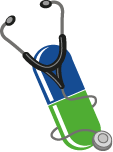ECDC patient story: Areti
Areti was just 13 years old when she was diagnosed with acute lymphoblastic leukaemia, a cancer of the white blood cells. During her cancer treatment, she developed an infection with Klebsiella, a difficult-to-treat bacterium, which had developed resistance to most broad-spectrum antibiotics. Besides the struggle to eliminate the infection, Areti's chemotherapy also had to be put on hold, thereby severely jeopardising her chances to fight cancer. After many days of treatment with last-resort antibiotics, the infection was finally eliminated, and her cancer chemotherapy could be resumed. Today, 12 years later, she is alive and healthy.

My name is Areti, I am 25 years old, and I currently work as a pharmacist in Athens. I now have a normal life. I enjoy travelling with friends, dancing, cooking, doing CrossFit, and giving some of my spare time to those in need – I volunteer as a nurse with the Red Cross.
Twelve years ago, my life was hanging by a thread after I was diagnosed with acute lymphoblastic leukaemia. I was admitted to the paediatric oncology hospital and, during the first days of treatment, the doctors inserted a catheter near my heart so I could start cancer chemotherapy as soon as possible.
After several weeks of treatment in the hospital I developed fever, which the doctors struggled to control. My body’s temperature remained very high for many days.
In my bloodstream, the doctors discovered an extremely resistant bacterium called Klebsiella, which normally lives in the intestine. This specific Klebsiella was untreatable with most of the antibiotics available at that time and, unfortunately, even today.
In order to ensure the total elimination of the extremely resistant Klebsiella, the doctors decided to temporarily put my chemotherapy treatment on hold. This endangered my chances of fighting the cancer, but even at my age I understood that I could only take one battle at a time.
My mother was very worried, and there was much uncertainty about the possibilities of treating the infection. I vividly remember the day when doctors informed us that the Klebsiella had possibly colonised my catheter and they had to take it out.
It was a painful decision, as this catheter was essential for receiving drugs and nutrition, and it was the second time it had to be removed and reinserted. However, I understood that it was the only solution to treating my infection. Despite receiving antibiotic treatment for a long time, the fever persisted and the tests continued to indicate the presence of antimicrobial-resistant bacteria in my blood.
Due to the severity of the infection and because my immune system was significantly compromised, I was placed in isolation. The nurses and doctors used strict contact precautions, and I couldn’t touch or hug my mother anymore. These moments were the worst during the entire period that I spent in the oncology clinic. It really devastated me.
I am very happy to have overcome life-threatening challenges, but I am fully aware that my success story is dramatically close to the stories of other patients who did not win those battles.
I was really convinced that my doctor would treat my leukaemia, but I was not sure whether I could get over the infection.
After extracting the catheter, the doctors continued with last-resort antibiotics for several more days, which finally produced results. I still remember the first day without fever. I was crying and feeling extremely grateful that a few last-resort antimicrobials were available and were effective in treating my infection. I knew then that I had won the first battle, and I was finally ready to face the second one, the cancer.
I won the battle against cancer as well, and today I enjoy life in Athens. I am very happy to have overcome life-threatening challenges, but I am fully aware that my success story is dramatically close to the stories of other patients who did not win those battles.
We must all fight with everything we have to keep antibiotics working: to use them prudently and only when they are needed, and also to improve hygiene and infection control in hospitals. We must do this to give all cancer patients a chance to live.
Commentary: case notes
Klebsiella species (spp.) belong to the normal flora of the human mouth and intestine. Infections with these bacteria are usually acquired in healthcare settings. Risk factors for Klebsiella spp. infections are prior antibiotic use and use of invasive devices, such as intravenous catheters, which was also the case for Areti.
Widespread use of antimicrobials is responsible for the development of multidrug resistance in Klebsiella spp. Varying hygiene and infection prevention and control practices further contribute to the spread of multidrug-resistant Klebsiella spp. Even with early antimicrobial therapy, the mortality rates of multidrug-resistant Klebsiella spp. infections are high, particularly where there is also bloodstream infection. Multidrug-resistant and sometimes hypervirulent strains (Emergence of hypervirulent Klebsiella pneumoniae) make treatment very difficult.
The Klebsiella strain isolated from Areti’s bloodstream was resistant to most antibiotics, including a class of last-line antibiotics, the carbapenems. Areti’s doctors acted quickly, provided the right antimicrobial treatment, implemented infection prevention and control measures such as isolating her from other patients to prevent the spread of the Klebsiella to other patients, and provided the necessary care for her to survive.
Carbapenem-resistant Klebsiella spp. are frequently reported by countries in southern and eastern Europe, but are also increasingly being reported in many other European countries and globally. In 2022, Greece, where Areti lives, reported one of the highest incidences of bloodstream infections with carbapenem-resistant Klebsiella among all EU Member States.
ECDC estimates that in 2020, more than 800 000 infections occurred in the EU/EEA due to bacteria resistant to antibiotics, and that more than 35 000 people died as a direct consequence of these infections. More than 4 000 of these deaths were due to carbapenem-resistant Klebsiella (K. pneumoniae) infections.


